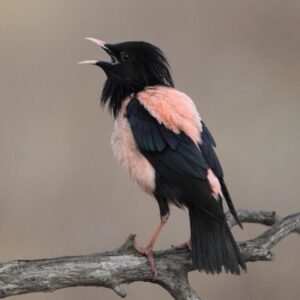
The release of the new Barbie film is just the excuse the RSPB have been waiting for to bring on the “Barbie birds” together for a star-studded premiere of pink prancers. Come and see the top ten. But it is worth thinking about the impact of Climate change on birds in the UK.
The 2017 state of the UK’s Birds report highlights how the changing climate is affecting the distribution, numbers and behaviours of the UK’s birds. Climate change is one of the biggest factors impacting nature in the UK. The average temperature in the UK during summer has increased by nearly 1°C since the 1980s – with 8 out of the 10 warmest years occurring since 1990. But, that was in 2017 – now in 2023 – six years later temperatures have been increasing.
As the temperate increases and their habitats start to change, some birds are being forced to move northwards in search of a new home. However, the warmer temperatures could be good news for those birds who only have a toe-hold in the UK. Traditionally birds, like blackcaps and chiffchaffs, spend their summer in the UK nesting and raising their chicks before heading back to southern Europe in September. However, with the warmer, wetter winters that the UK has experienced in recent years there has been an increase in birds spending the winter here instead of migrating south.
Swallows migrate thousands of miles to and from southern Africa each year to nest and raise their chicks. On average these birds are now arriving 15 days earlier than they did in the 1960s, while delaying their return journey meaning they are spending up to 4 weeks longer in the UK each year.
It isn’t only migrant birds that are changing their behaviour because of climate change. One of our most familiar garden birds, and Big Garden Birdwatch top 10 regular, the great tit is laying its eggs 11 days earlier than 40 years ago.
The State of the UK’s Birds report is produced by a coalition of three NGOs: RSPB, BTO and WWT, together with the UK’s statutory nature conservation bodies. Since 1999, it has been providing a one-stop shop for all the latest results from bird surveys and monitoring studies, helping to reveal how our bird life is doing.
